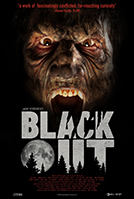Blackout

| Original title: | Blackout |
| Director: | Larry Fessenden |
| Release: | Cinema |
| Running time: | 103 minutes |
| Release date: | 13 march 2024 |
| Rating: |
Mulder's Review
Larry Fessenden's Blackout is a testament to the director's unrivalled ability to breathe new life into classic horror themes, while weaving them into a larger theme of societal reflection. Premiering at the Fantasia 2023 International Film Festival, which our media covered virtually this year, this nuanced werewolf tale transcends genre conventions, offering a stimulating and emotional experience that unfolds over the course of a deeply captivating narrative.
The film introduces us to Talbot Falls, a small town steeped in history and haunted by the shadows of its past. Larry Fessenden carefully establishes the town as a microcosm, a reflection of the larger social and political landscape. In this context, the werewolf myth occupies a central place, but instead of succumbing to cliché, Larry Fessenden uses it as a vessel to explore the complex interplay between personal demons and societal challenges.
At the heart of Blackout is Charley Barrett, played with remarkable depth by Alex Hurt. Charley is not the archetypal werewolf; he's a tortured artist struggling with alcoholism, grief and the consequences of his own actions. Larry Fessenden's decision to focus on Charley's internal struggles rather than sensational werewolf terror adds layers of complexity to the narrative. The film becomes a character study, an exploration of the moral responsibility that comes with recognizing one's monstrous nature.
As Charley navigates the complexities of her own life, the town becomes a character in itself, representing a microcosm of the larger societal issues that plague contemporary America. The cinematography captures the essence of the city, each frame serving as a visual metaphor for the underlying tensions and struggles. The gradual unveiling of the town's response to werewolf attacks exposes deep-seated issues of racism, environmental exploitation and economic corruption.
Larry Fessenden masterfully integrates socio-political commentary into the narrative, using the werewolf myth as a means of addressing pertinent issues. The unjustified blaming of a Latino construction worker, played by Rigo Garay, becomes a poignant commentary on racial prejudice and scapegoating. The dynamics of the city, reflecting broader societal trends, show that Larry Fessenden is acutely aware of the wider implications of his story.
The entire cast, including seasoned actors such as Barbara Crampton and Jeremy Holm, delivers performances that bring richly developed characters to life. Alex Hurt's portrayal of Charley Barrett is remarkable, capturing the nuances of a man torn between his artistic spirit and the monstrous transformations that haunt him. Hurt's ability to convey the internal struggle adds authenticity to Charley's character, making him sympathetic and relatable despite the supernatural elements.
The film's pace, though slow at times, is intended to allow the audience to immerse itself in the complexities of the characters and the town. Larry Fessenden's deliberate approach pays off as the emotional weight increases, leading to a crescendo that leaves a lasting impact. Werewolf attacks, when they do occur, are handled with a deft balance of gore and emotional resonance, ensuring that they serve the narrative rather than drifting into gratuitous violence.
Blackout also stands out for its visual aesthetic, with cinematographer Collin Brazie capturing the essence of Larry Fessenden's vision. The transformation scenes, inspired by Charley's artwork, are a visual feast that blurs the boundaries between reality and the supernatural. The werewolf design, which pays homage to classic representations, adds a touch of nostalgia while remaining fresh and relevant.
The film's soundtrack, composed by Will Bates, is an outstanding feature. The haunting melodies and atmospheric sounds enhance the overall visual experience, creating an immersive soundscape that complements the film's eerie atmosphere. The music becomes a character in its own right, reinforcing the emotional impact of key scenes.
Larry Fessenden's return to directing marks a turning point in his career. Building on the foundations laid by previous works such as Habit and Depraved, Larry Fessenden proves once again that he is a maestro of psychological monster movies. While Blackout doesn't adhere to the typical werewolf movie formula, its unique approach distinguishes it as a compelling and thought-provoking addition to the horror genre.
Blackout is a modern masterpiece that explores the intersection of personal demons and societal challenges through the werewolf myth. Larry Fessenden's fine storytelling, combined with outstanding performances and atmospheric imagery, elevates the film beyond the limits of genre expectations. It's a testament to the enduring power of classic monsters in contemporary cinema, and to Larry Fessenden's ability to infuse them with relevance and depth. Blackout is not just a werewolf story; it's a haunting exploration of humanity's struggle against its own monsters, both internal and external.
Blackout
Written and directed by Larry Fessenden
Produced by James Felix McKenney, Chris Ingvordsen, Larry Fessenden
Starring Alex Hurt, Addison Timlin, Motell Gyn Foster, Joseph Castillo-Midyett, Ella Rae Peck, Rigo Garay, John Speredakos, Michael Buscemi, Jeremy Holm, Joe Swanberg, Kevin Corrigan, Barbara Crampton, James Le Gros, Marshall Bell
Music by Will Bates
Cinematography : Collin Brazie
Production companies : Glass Eye Pix
Distributed by Dark Sky Films
Release date : March 13 2024 (United States)
Running time : 103 minutes
Viewed : August 5, 2023 (screener press)
Mulder's Mark:

